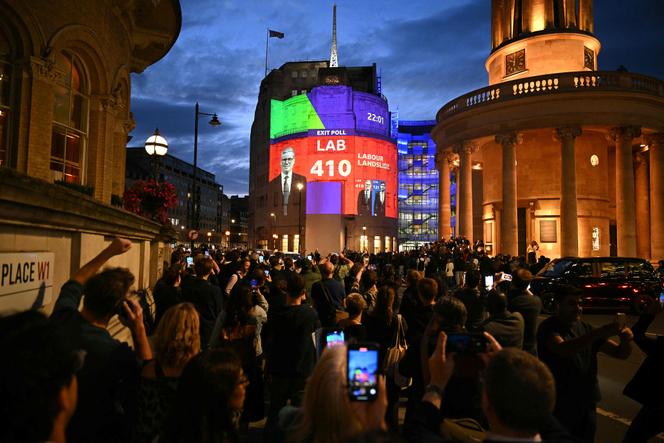


The British political landscape was turned upside down on Thursday, July 4, with Labour's landslide victory ending 14 years of Conservative government. On Friday morning, Labour leader Keir Starmer, 61, was poised to become the 58th British prime minister. He will also be only the fifth from the left-wing party founded in 1900 to lead his opposition party to Downing Street, after Ramsay McDonald, Clement Attlee, Harold Wilson and Tony Blair.
The "red" (Labour's color) tsunami, including in the traditional "red wall" constituencies – those post-industrial lands in the Midlands and north of England that voted for Brexit in 2016, then for Boris Johnson in 2019 – is all the more remarkable as it comes after a crushing defeat in the 2019 general election, its worst since 1935.
With at least 410 MPs elected – the majority in the House of Commons stands at 326 seats – the victory of Labour and Starmer – a lawyer with a brilliant career who entered politics only nine years ago, but who was re-elected on Thursday in the central London constituency of Holborn and St Pancras – is as historic as that of Blair in 1997, albeit under very different conditions. Blair was swept to power by popular fervor, with New Labour conveying a message of modernity in a country that was still optimistic about the future and a continent at peace. This year's campaign was marked by a lack of enthusiasm and trust among British voters.
It must be noted that if, like his predecessor 30 years ago, Starmer campaigned on a centrist manifesto, he shied away from any audacity, modestly pledging a return to "stability", with no major break from the Conservative trajectory on immigration control and fiscal orthodoxy. Labour is "ready to serve our country, ready to restore Britain to the service of working people," Starmer said in his victory speech at dawn on Friday.
Voters primarily punished the Tories for their chaotic years in power, during which British incomes stagnated, public services and social benefits were undermined by a drastic austerity cure, and Brexit isolated the country on the international stage and penalized its economic attractiveness.
The Conservative Party, with less than 120 MPs – nearly 250 fewer than in 2019 – is suffering its worst defeat since 1906, when it had saved just 156 seats from the liberal democrats, the main opposition party at the time. The careers and political ambitions of many Tory heavyweights were cut short on Thursday evening.
One obvious symbol of this catastrophic election for the Tories: Liz Truss, 56th Prime Minister, ousted from Downing Street in October 2022 after the shortest term in the country's history, lost her seat in Norfolk. She was not the only big name who fell. Secretary of State for Defence Grant Shapps also lost his seat, along with his education colleague Gillian Keegan, and the leader of the House of Commons, Penny Mordaunt. In the early hours of Friday morning, Rishi Sunak, who for his part was easily re-elected, acknowledged the Conservatives' defeat. "I take responsibility for the loss" of seats, said the outgoing government leader. The question is whether he will remain leader of the Tories for long. Suella Braverman, his very right-wing ex-interior minister who for months has made no secret of her desire to replace him, was also re-elected and will be able to weigh in on the probable recomposition of the party.
You have 51.22% of this article left to read. The rest is for subscribers only.
